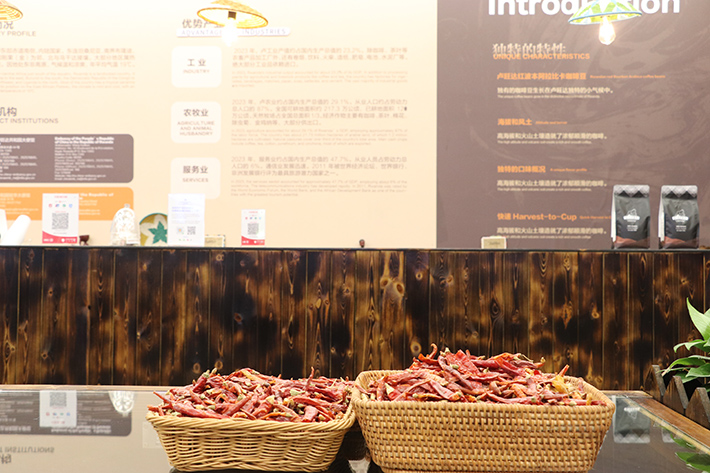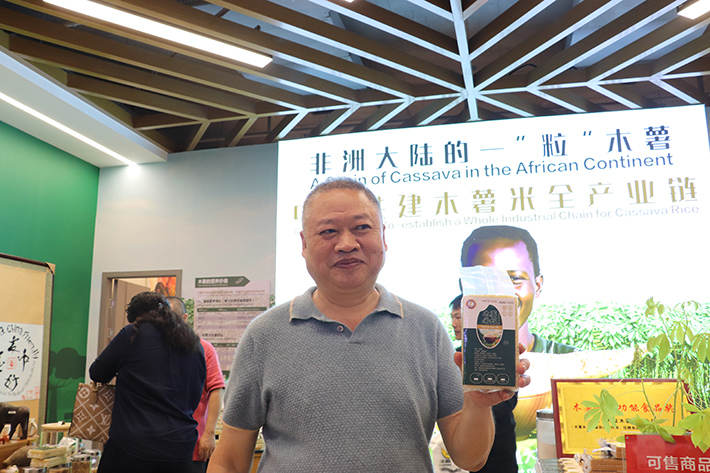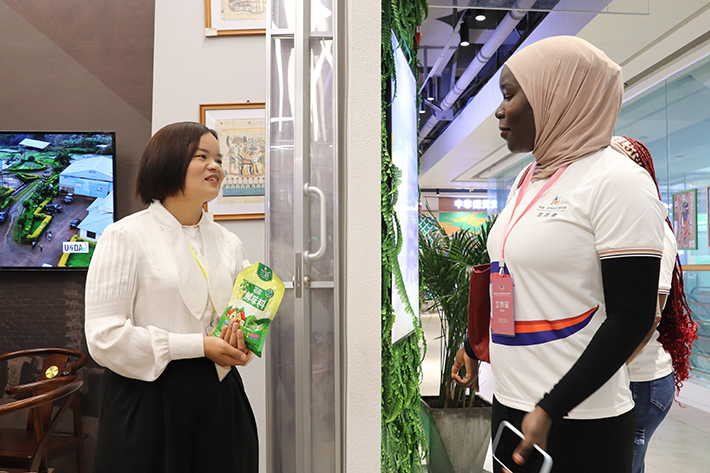|
||||||||||
| Home Top News Economy/Tech Culture/Sports China in Foreign Eyes Green Development Videos Intangible Cultural Heritages |
|
||||||||||
| Home Top News Economy/Tech Culture/Sports China in Foreign Eyes Green Development Videos Intangible Cultural Heritages |
| ChinAfrica |
| Chinese Entrepreneurs Tap China-Africa Cooperation Potential in Changsha |
| CAETE Permanent Exhibition Hall has become a launchpad for Chinese entrepreneurs keen to innovate and deepen their engagement with Africa |
| By Hu Fan | Web Exclusive ·2025-06-14 |
As the fourth China-Africa Economic and Trade Expo (CAETE) opened on 12 June in Changsha, Hunan Province, its CAETE Permanent Exhibition Hall in Yuhua District - a key satellite venue - saw a large number of visitors and intense business activity.
Launched in September 2021 during the second edition of CAETE, the Permanent Exhibition Hall has become a signature platform in Hunan’s bid to build what it proudly calls “a China-Africa Economic and Trade Expo that never ends.” Spanning 10,000 square metres, the hall now features 32 national pavilions from African countries including Kenya, Tanzania and Zambia, and showcases products from all 53 African nations that have diplomatic ties with China.

Rwandan dried chili peppers are displayed in the Rwandan pavilion (Hu Fan)
But the space is more than just a showroom for African goods. Increasingly, it has become a launchpad for Chinese entrepreneurs keen to innovate and deepen their engagement with Africa.
Among the most eye-catching innovations at the exhibition is a unique cassava-based rice product developed by Longzaitian, a Hunan-based food company. Imported fresh from Africa, the cassava is crushed, dried, and reshaped into grains that resemble rice. According to Chairman Liu Changxun, the company is a pioneer in turning cassava into a rice-like staple.
Prepared and served fresh in the Nigerian pavilion, the product has surprised many visitors with its taste and texture, closely resembling traditional rice. Liu noted that the innovation solves a common challenge: the short shelf life of fresh cassava due to its high moisture content. Moreover, cassava rice is rich in vitamins and aligns with rising demand for healthier food options in China.
Encouraged by the market response, Longzaitian is planning to set up processing plants in Africa to localise production and build an integrated cassava industrial chain.

Liu Changxun presents Longzaitian’s cassava-based rice product (Hu Fan)
In the Kenyan pavilion, tea is the main attraction. Lieguzi, a Hunan-based company specialising in tea and coffee, offers a selection of products sourced from Kenya and Rwanda. Its established local processing facilities enable the company to export fully finished goods to China.
Lieguzi’s tea products have been a crowd-puller at CAETE. At the 2023 edition of the expo, the company received orders worth over 20 million yuan ($2.8 million), selling out its entire stock, including samples.
Wang Mingjie, a sales manager at Lieguzi, attributes their success to the unique combination of Chinese expertise and African terroir. “Tea varieties we know in China take on a distinctive flavour when grown on African soil and processed using Chinese techniques,” he told ChinAfrica. “It is this fusion of Chinese and African elements that makes our products stand out.”

Wang Mingjie showcases Lieguzi’s tea products in the Kenyan pavilion (Hu Fan)
For Sa Lanyue, chairman of Lanyue, a seasoning manufacturer based in Yunnan Province, Africa represents a promising new market for their halal-certified products – from tea seed oil to hot pot base. Already exporting to Malaysia, Singapore and Thailand, the company is using CAETE as a springboard to expand into African markets.
“Africa is rich in raw ingredients like pepper and has a large Muslim population,” Sa explained. “We see huge potential.”
This potential is already turning into tangible results: Lanyue is in discussions to set up a local production facility in Senegal to manufacture and distribute its products more efficiently.

A Lanyue staff member promotes seasonings to a visitor (Hu Fan)
Jianxin, a plastic goods manufacturer from Yongzhou in Hunan, is also exploring new opportunities. Originally focused on the domestic market, the company now aims to supply woven plastic bags to Africa’s agricultural and mining industries, where demand is high.
The company currently imports polypropylene granules from Tunisia as raw material. For Sales Manager Wen Huacheng, CAETE offers a valuable platform to engage more deeply with African clients. “Our bags are finely manufactured, and we believe they can meet the needs of African markets,” he said, expressing optimism about forging new partnerships.

Wen Huacheng showcases a woven plastic bag (Hu Fan)
In recent years, Hunan Province has intensified efforts to position the CAETE Permanent Exhibition Hall as a dynamic driver of China-Africa engagement. Far beyond a physical venue, the hall now functions as a comprehensive platform for product display and sales, business matchmaking, resource coordination, and cultural exchange.
As these Chinese companies demonstrate, the Permanent Exhibition Hall has evolved into a vital bridge connecting innovation and opportunity - symbolising the deepening economic ties and growing mutual understanding between China and Africa. It is helping to turn shared development aspirations into reality, one partnership at a time.
| About Us | Contact Us | Advertise with Us | Subscribe |
| Copyright Beijing Review All rights reserved 京ICP备08005356号-5 京公网安备110102005860号 |